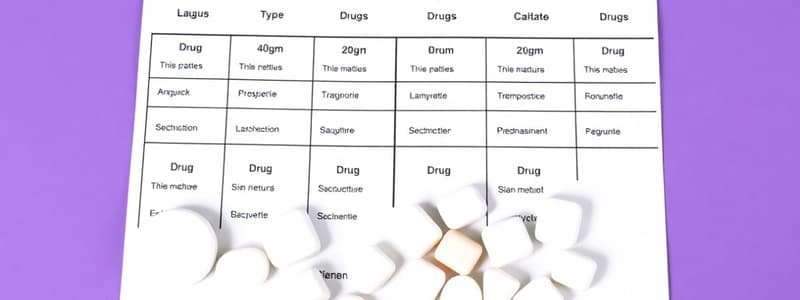Podcast
Questions and Answers
Match the following classifications of drugs with their descriptions:
Match the following classifications of drugs with their descriptions:
Structural classification = Grouped by chemical structure Therapeutic classification = Grouped by medical use Pharmacological classification = Grouped by drug action Toxicological classification = Grouped by potential toxicity
Match the following drug classifications with their primary criteria:
Match the following drug classifications with their primary criteria:
Antibiotics = Fight bacterial infections Analgesics = Relieve pain Antidepressants = Treat mood disorders Antihypertensives = Lower blood pressure
Match each type of drug classification with an example:
Match each type of drug classification with an example:
Opioids = Analgesics Benzodiazepines = Anxiolytics Statins = Cholesterol-lowering agents Antibiotics = Infections treatment
Match the following drug properties with their classification categories:
Match the following drug properties with their classification categories:
Match the therapeutic uses of drugs with the correct drug classes:
Match the therapeutic uses of drugs with the correct drug classes:
Which suffix is commonly associated with antianxiety drugs?
Which suffix is commonly associated with antianxiety drugs?
What is the common suffix for antibiotics that indicates a penicillin derivative?
What is the common suffix for antibiotics that indicates a penicillin derivative?
Which of the following suffixes indicates the class of antihypertensives known as ACE inhibitors?
Which of the following suffixes indicates the class of antihypertensives known as ACE inhibitors?
Which suffix is typically found in the names of antidepressants?
Which suffix is typically found in the names of antidepressants?
Which suffix is associated with local anesthetics?
Which suffix is associated with local anesthetics?
What suffix is commonly associated with antiviral medications?
What suffix is commonly associated with antiviral medications?
Which of the following suffixes indicates a type of diuretic?
Which of the following suffixes indicates a type of diuretic?
Which drug classification is associated with the suffix 'sone'?
Which drug classification is associated with the suffix 'sone'?
What suffix is typically used for neuromuscular blockers?
What suffix is typically used for neuromuscular blockers?
Which suffix is characteristic of antihyperlipidemics?
Which suffix is characteristic of antihyperlipidemics?
Match the following drug types with their corresponding suffixes:
Match the following drug types with their corresponding suffixes:
Match the following drug classes with their specific suffixes:
Match the following drug classes with their specific suffixes:
Match the following suffixes to their corresponding drug classes:
Match the following suffixes to their corresponding drug classes:
Match the following classifications of drugs with their related suffixes:
Match the following classifications of drugs with their related suffixes:
Flashcards
Drug Classification
Drug Classification
Grouping drugs with similar characteristics.
Structural Classification
Structural Classification
Classifying drugs based on their chemical structure.
Therapeutic Classification
Therapeutic Classification
Classifying drugs based on the diseases they treat.
Drug Class
Drug Class
Signup and view all the flashcards
Therapeutic Use
Therapeutic Use
Signup and view all the flashcards
Antianxiety drugs
Antianxiety drugs
Signup and view all the flashcards
Antivirals
Antivirals
Signup and view all the flashcards
Antibiotics
Antibiotics
Signup and view all the flashcards
Anticoagulants
Anticoagulants
Signup and view all the flashcards
Anticonvulsants
Anticonvulsants
Signup and view all the flashcards
Neuromuscular Blockers
Neuromuscular Blockers
Signup and view all the flashcards
ACE Inhibitors
ACE Inhibitors
Signup and view all the flashcards
Antihyperlipidemics
Antihyperlipidemics
Signup and view all the flashcards
Proton Pump Inhibitors
Proton Pump Inhibitors
Signup and view all the flashcards
What are antibiotics used for?
What are antibiotics used for?
Signup and view all the flashcards
What are antivirals used for?
What are antivirals used for?
Signup and view all the flashcards
What is the purpose of anticoagulants?
What is the purpose of anticoagulants?
Signup and view all the flashcards
What are anticonvulsants used for?
What are anticonvulsants used for?
Signup and view all the flashcards
What are neuromuscular blockers used for?
What are neuromuscular blockers used for?
Signup and view all the flashcards
Study Notes
Drug Classification
- Drugs are grouped together based on similar properties
- Drugs can be classified by their structure
- Drugs can be classified by their therapeutic use
Drug Types and Suffixes
- Antianxiety drugs: pam
- Antivirals: vir, ine
- Antibiotics: cycline, cillin, micin, mycin, xacin, beta-adrenergic blocking agents, olol
- Anticoagulants: parin, ase
- Benzodiazepines: pam
- Anticonvulsants: pam, toin, bronchodilators, rol, ine
- Antidepressants: ine, pram, calcium channel blockers, ine
- Antihistamines: ine
- Corticosteroids: sone
- Antihypertensives (ACE inhibitors): pril
- Diuretics: ide
- Antihyperlipidemics: statin
- Local Anesthetics: caine
- Antimigraine: ptan
- Antipsychotics: zine, ine
- Neuromuscular blockers: ium
- Proton Pump Inhibitors: azole
Studying That Suits You
Use AI to generate personalized quizzes and flashcards to suit your learning preferences.




